“It’s 106 miles to Chicago, we got a full tank of gas, half a pack of cigarettes, it’s dark… and we’re wearing sunglasses.” “Hit it.”
I have to wonder what the executives at Universal Pictures thought while The Blues Brothers was in production. Besides the fact that it went over budget and ran over on time, which are always concerns, it had to have seemed to be a little risky just on the face of it. John Belushi and Dan Aykroyd, the stars, were both popular comedic actors, but their previous outing together, Steven Spielberg’s 1941, had a lackluster reception at the box office (likewise, so did their third and final collaboration, Neighbors; both are actually good films, but have largely been forgotten). Belushi had Animal House to his name, but nothing else of note; Aykroyd didn’t even have that. The characters of the Blues Brothers were known from their appearances on Saturday Night Live, but as a musical act more than just a comedy sketch, and there hadn’t been any prior attempt to bring an SNL concept to the big screen (though obviously there would be several later; other than Wayne’s World, I don’t think any of them were worth watching.)
Musicals were largely a thing of the past. So was blues music. The film called for the casting of several blues and R&B musicians in significant roles, and not only were they not experienced actors, but most of their careers were in slumps at the time; they weren’t going to draw any audiences in on their own. Dan Aykroyd was the writer who came up with all of the ideas, and he hadn’t made a name for himself as a writer yet; in fact, it was his first project, and he handed director John Landis a literal tome — the size of and in the covers of a phone book — which Landis then had to trim down in order to make a working screenplay out of it. Landis himself was also known solely for Animal House and a couple of schlocky cult comedy films — Kentucky Fried Movie and one literally titled Schlock. And then in order to shoot everything that still remained after Landis trimmed the script, they would have to get unprecedented permission from the city of Chicago to film. On the surface, it had to have looked like a risky proposition; there was every chance that it’s large-for-the-day budget of $27 million would be going to a box office bomb.
“It’s a f’ing barn… we’ll never fill it.”
Of course, it was anything but a flop. The movie cemented Belushi’s place as a comedy legend and Landis’s place as a great comedy director, put Dan Aykroyd on the map as a movie star, re-invigorated interest in the blues and the musicians who starred in the film, and went on to be one of the most highly regarded comedy films of all time. Not bad for a couple of Chicago hoodlums.
The film opens with “Joliet” Jake Blues (Belushi) being released from the Illinois prison which gives him his nickname. He’s picked up by his brother, Elwood (Aykroyd), in the new Bluesmobile — which to Jake’s disgust is a former police car. The supplemental materials waffle and waver over whether Jake and Elwood Blues were literal brothers or if they simply adopted each other as such. It doesn’t matter much; they grew up together, they think of themselves as brothers, and they support each other, love each other, and fight each other as brothers. Jake’s frequent lying bothers the slightly more devout Elwood (who isn’t above “bullshitting” himself if the need arises), and Elwood’s motorhead tendencies make Jake nervous with his crazy driving. Of course, we never see Jake himself drive, and there’s only one reference near the end to indicate that he even knows how. Elwood wins him over on the Bluesmobile with a demonstration of the car’s capabilities (“It’s got a cop motor, a four hundred and forty cubic inch plant, it’s got cop tires, cop suspension, cop shocks, it was a model made before catalytic converters so it’ll run good on regular gas.”) He knows that in order to stay ahead of the law, he has to be able to match the law.
At Elwood’s insistence, they go to make good on a promise Jake made to visit “the Penguin”, Sister Mary Stigmata (Kathleen Freeman), who manages the orphanage where they grew up. She informs them that the orphanage is due to be shut down and sold to the board of education for being unable to pay its taxes. Jake offers to pay, but the Penguin doesn’t want any of their stolen money — prompting a hilarious scene in which the two grown men find themselves repeatedly battered with a ruler as if they were still children. In the basement of the orphanage, they talk it over with Curtis (Cab Calloway), an employee of the orphanage who helped instill them with their love of blues music. They may not care much for Sister Mary Stigmata, but they don’t want to see Curtis out on the street, or the orphans, so they try to figure out a way to earn the $5000 in eleven days legitimately. At Curtis’s suggestion, they pay a visit to the church of Reverend Cleophus James (James Brown), and there Jake finally sees the light.
“Yes! Jesus H. Tap-Dancing Christ, I have seen the light! The BAND!”
Jake comes up with a plan to earn the money for the orphanage legitimately. They’re putting the band back together. They’re going to put on a show. Of course, first they have to find the band. Elwood hasn’t actually been keeping in touch with them like he told Jake (“What was I gonna do? Take away your only hope? Take away the very thing that kept you going in there? I took the liberty of bullshitting you.”) They’ve all moved on to other gigs, and sometimes other careers. And even when they accomplish that, they have to get gigs that will actually pay the money necessary to pay the band and save the orphanage.
That’s not their only problem. While they mean well, Jake and Elwood can’t avoid causing trouble whereever they go. Running a red light leads to the revelation that Elwood’s license is suspended… and of course, he doesn’t stop to let the police impound his car, earning him the personal enmity of Troopers Mount (Steven Williams) and Daniel (Armand Cerami). They misrepresent themselves as another band at Bob’s Country Bunker, and leave without paying their extensive bar tab, leading the actual Good Old Boys (led by Charles Napier as Tucker McElroy) to chase after them, with Bob (Jeff Morris) in tow. And, of course, they leverage their own means of freedom of expression to drive a group of protesting American Nazis (led by Henry Gibson) off a bridge, to the cheers of the crowd.
“I hate Illinois Nazis.”
These antics, besides providing much of the comedy of the film, also provide its action. The Blues Brothers has more car chases, and more spectacular car chases than most action movies. Much of the film consists of Jake and Elwood driving around, trying to lose their pursuers, as the chase keeps escalating further and further into heights of hilarious absurdity. And it’s not just funny, it’s also exciting, largely due to a sense of realism that’s built into the way the film was made. How do you make an increasingly absurd car chase look realistic? By actually doing it for real. As Landis explains in featurettes on the film, virtually everything shown in the film is something they actually did (with the one notable exception being the Bluesmobile’s back-flip during the final chase sequence). When they are shown driving over 100 miles per hour in downtown Chicago, they really are driving over 100 miles per hour in downtown Chicago (filming was largely done on weekends and holidays to prevent interference with traffic, and pedestrians were cast to stand on the corners to show that the scenes weren’t artificially sped up). All wrecked cars were indeed wrecked by professional stunt drivers — in all, 103 cars were wrecked in the film, which was a record that lasted until it was deliberately topped by one car in Blues Brothers 2000. (This would be the only aspect in which Blues Brothers 2000 topped the original, though it was able to get some other musical guests as well.) The “mall with everything” was genuinely plowed through with actual cars. It was an abandoned mall that they stocked with supplies from corporate sponsors, with careful instructions on which sets they could destroy and which they couldn’t.
“Lots of space in this mall…”
Even the scene in which they drive the Bluesmobile through the front doors of the Daley Building was genuine. But that’s arguably not even the most outlandish thing that Landis did in order to make the film look authentic. Fans of the film will certainly remember the scene in which the Head Nazi’s Pinto falls off a bridge and plummets to the streets of Chicago. How do you make a scene with a Pinto falling from several miles in the air look realistic? By dropping a Pinto from several miles in the air, of course! Landis actually had a helicopter raise the Pinto up into the air, and air-dropped it onto their mark. He even had to get FAA approval certifying that the Pinto wasn’t aerodynamic due to the city of Chicago’s concern that it could act as an airfoil and drift off the mark. They proved it wasn’t, he got his approval, and he air-dropped a Pinto on film for the benefit of comedy.
“I have always loved you.”
The singing, too, is authentic of course. There isn’t an original song in the movie; it’s all classic blues and R&B tunes (with the occasional other genre thrown in for comedic effect). And the people you see singing it are the people who actually sing it. While some of the voices are synced for technical reasons, if someone is singing on camera, it was them singing in the recording booth as well. There are no “voice over singers” for John Belushi or Dan Aykroyd — which makes sense when you consider the band was formed by the duo for the purpose of playing music, before they even considered putting them on Saturday Night Live, let alone making a movie out of the concept. And all of the classic blues musicians portrayed in the film — who, incidentally, all turn in great performances even without the caveat of them not being professional actors — recorded new renditions of their songs for the film. A few of them had to have their songs filmed live in the film due to the fact that they never quite sing the song the same way twice, and therefore can’t lip-sync. James Brown and John Lee Hooker are both shot live in the film; Aretha Franklin, who has the same problem, arguably should have been as well, but this is a minor flaw in an otherwise great scene.
“You better think about what you’re saying. You better think about the consequences of your actions.”
The film was originally intended to have an intermission, as with older musical motion pictures. This is one area where Universal put their foot down and won against Landis and Aykroyd. The intermission was omitted, and the film was cut down in length from its original run-time prior to its theatrical release. Some of that footage has never been recovered, though Landis thinks it may be out there somewhere. And for television, even more of the film is often cut out, particularly if one isn’t viewing it on a “premium” movie network; many of us who grew up watching it on television in the 80s saw a version that was cut down to an hour and a half. The DVD release restores not only the theatrical version, but the cut scenes that they were able to find, bringing it to a length of almost two and a half hours. This is important, as there are a lot of scenes that help to build the film up and establish more of what’s going on. Most notable are a couple of scenes featuring Elwood’s apartment and job. Besides expanding a little bit on Elwood’s life while Jake was in prison, these set up the various aerosol can gags he pulls later (he steals them from his employer, a manufacturer), as well as the Wrigley Field joke, in addition to having some good gags of their own. Plus, the introduction to John Candy’s detective Burton Mercer actually occurs during the apartment scene; Candy’s character has always been a popular one-scene wonder, but in the expanded version of the film we actually get to see him show up before the final sequence. Even more important, these added scenes and some expansions of other scenes mean there are more attacks by Carrie Fisher’s character, who in television edits seems to just come out of nowhere in the last act. It’d be a great scene regardless, but it’s even better when it’s the pay-off to a running mystery and not just a one-off incident. In a way, if you’ve only seen the TV edit of The Blues Brothers, you haven’t seen the real film.
“This, gentlemen, is the elegant abode of one Elwood Blues.”
Something that surprised me a bit on re-watching the film is how “clean” it is for an R-rated film. There are bursts of foul language here and there, but that’s it. As John Belushi noted in an interview at the time, there’s no sex or drugs in the film. (The Brothers do drink, but even that isn’t to excess, at least not in the film.) Even all of the carnage they cause is almost entirely property damage — the only people to actually get hurt in the film are the Head Nazi and his second-in-command, who are acceptable targets. Really, the language is the sole reason that this film received an R rating. This is more just a note of interest than any commentary on the film itself, but it was something that struck me while watching it for the umpteenth time for this review.
The other thing that struck me is how, even though I’ve seen all these jokes dozens of times, they still make me laugh. There is a simple timeless quality to the humor here. The deadpan delivery Elwood gives everything, and Jake gives almost everything (except when he needs to ham it up) just cracks me up. And just about everybody gets a funny line or two, no matter how minor their characters are. The band members get sarcastic jabs at their leaders, Trooper Mount manages to be funny with just his tone, and of course John Candy does so much with such a small role that he arguably deserves third billing on the film. Henry Gibson — who by all appearances is a really nice guy in real life — plays the Head Nazi in such a way that a difficult subject is actually made funny by his performance and the situation. Carrie Fisher manages to do a lot with glares and glowers in her early scenes, and finally gets to cut loose with an epic rant at the end (countered, of course, by Belushi’s puppy dog eyes).
“There was an earthquake, a terrible flood, locusts! It wasn’t my fault!! I swear to God!”
The musical “guests” all put in solid performances as well. Even more interesting, most of them (aside from John Lee Hooker) are given integral roles to the film. Cab Calloway’s performance as Curtis is responsible for much of the plot happening in the first place. James Brown fits perfectly as the Reverend Cleophus James, and Aretha Franklin is great as Matt Murphy’s wife. And of course, we can’t forget Ray Charles as the music shop owner and the most terrifying marksman in cinematic history. And as important as the musicians are, the music itself is just as important. This is a film about playing music, and so it takes a bit of a different tack than most movie musicals. Landis does include a few scenes where people break into song to express themselves, but he also includes standard performances, dance numbers, a religious musical piece… as he states in one of his commentaries, he tried to include every kind of musical number that he could. And it works. There is scarcely a minute of this film that doesn’t have some music playing, either in the foreground or the background, and this keeps the tone of the film consistent throughout.
The Blues Brothers features great music, great car chases, entertaining characters, and side-splitting laughs. It’s arguably John Belushi’s best film (Animal House being the other possibility), and arguably Dan Aykroyd’s as well (Ghostbusters being the prime contender, and I’d have a hard time picking between them). It’s definitely the best film to feature the two of them, and it’s probably John Landis’s best film as well. (I realize I may take some flak for putting it above Animal House, which has certainly earned its fans, but as much as I like that film, I don’t think it’s quite as good overall.) It’s #69 on Bravo’s list of the funniest movies, and #14 on Total Film’s. It is, in my opinion, one of the finest comedies ever made, and it’s one of my favorite films.
“They’re not gonna catch us. We’re on a mission from God.”





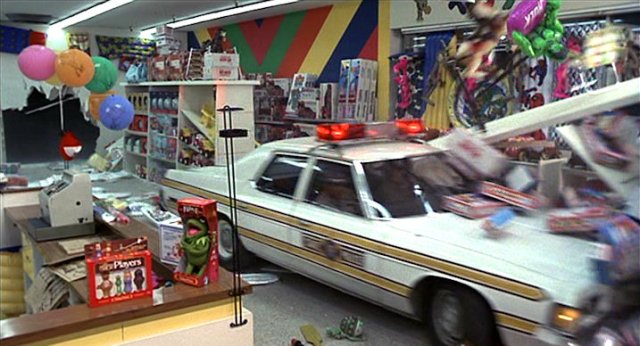

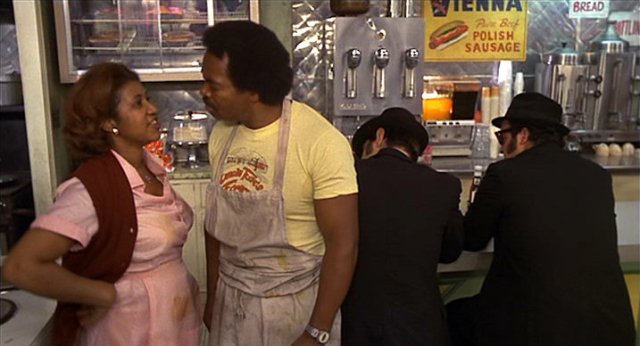
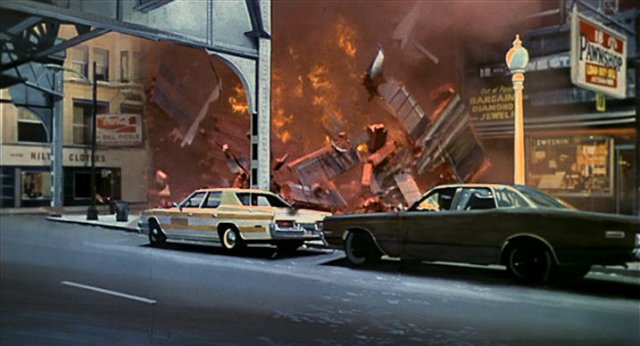
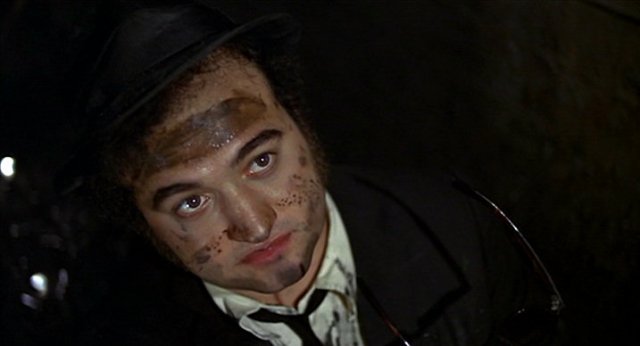
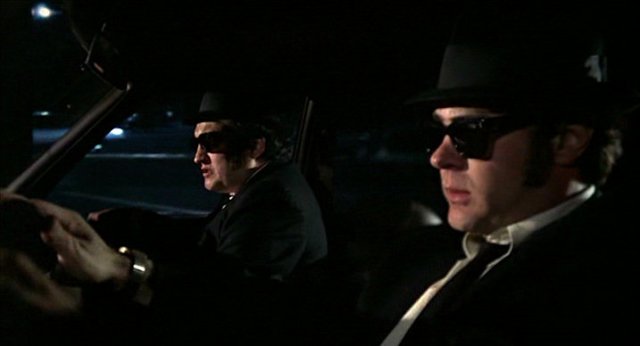

Well done. Well done.
(Clapping)
Tweeted. Reddited. Stumble Uponed and Facebooked.
I feel as though I have to table my MTESS “The Blues Brothers” for at least 8 months now. Not that it was in progress or anything… Lets just say I’m glad it wasn’t. Excellent read. Great choice.
Bravo, man, bravo.
Thank you, Fogs. I really appreciate the support. And while I don’t think you should feel like you need to table your MTESS, I do know how you feel on that. I haven’t yet given Ghostbusters the Favorite Films treatment yet because I noticed when I started the series that it was one of your early MTESSs. Didn’t want to start mine with the same one you had already covered, so I waited a little bit and did Planes Trains and Automobiles, and just haven’t gotten around to GB yet. Probably going to hold it until October… it’s a good October choice.
I’m glad you consider The Blues Brothers to be MTESS-worthy, though. When I was doing a bit of research for this, I was surprised that although it was nominated for three different AFI lists, it didn’t make it on to any of them. Just flabbergasted me.
One of the greatest comedies ever, tons of great music, one of my favorite films of all time. No doubt. I’ve had the Leading header pic chosen for awhile, I just… hadnt gotten to it yet.
Definitely a worthy, worthy flick.
See, now I’m going to be curious about the image you’ve picked… certainly a lot of good Blues Brothers fan-art out there…
Its easy to agree with a positive review for a movie you love, doubly so when the reviewer points out everything you love about the movie, which you just did. I think I may have injured my neck from nodding in agreement as I read this. And not only is this one of my favourite films it also has one of the best soundtrack albums of all time – the only thing missing from it is the Blues Brothers version of “Stand By Your Man”
There is only one thing I disagree with in the review – There are two areas where Blues Brothers 2000 tops the original. The number of cars wrecked, and John Goodman’s singing is on a completely different level to Aykroyd and/or Belushi. That man has such a set of pipes on him, it blows me away.
“Stand By Your Man” is definitely a curious omission from the soundtrack album. There are a lot of songs in the movie that aren’t used, but that and “Boom Boom” by John Lee Hooker are the only ones that are really prominent and yet left off. If they came out with an expanded version of the soundtrack, I’d definitely be picking it up.
And I’ll grant that Goodman has a good set of pipes. In fact, the music in the second one is, although not better, certainly as good as the original. And I like that they got more blues musicians in there, such as B.B. King and Eric Clapton and Bo Diddley and all the others. But there was an awful lot wrong with that film, sadly…
Great write-up. I’d actually take Blues Brothers any day over the overrated (IMO) Animal House.
Thank you, K2, and it’s nice to know I’m not alone in supporting Blues Brothers over Animal House. I like Animal House, but I do think it gets more acclaim than it probably should. Of course, living in the area where it was filmed might be skewing my perceptions of just how well regarded it is some.
Along with O Brother Where Art Thou, this is my favorite musical that’s not technically a musical. It’s hard to say anything else that you haven’t already covered, it is 106 miles to Chicago and I wouldn’t want to have any other two guys driving the car.
Ha ha ha… one of the things that Landis was harping on in his commentary was that he couldn’t get why people don’t consider The Blues Brothers a musical. I agree with him on that… it’s not a conventional musical, but it’s definitely a musical. And O Brother, Where Art Thou is a great movie as well; definitely my favorite Coen Brothers film out of the ones I’ve seen.
Pingback: Follow Fridays!: Morgan on Media | Fogs' Movie Reviews
This is one of my favorites too. If you might remember I had Jake as my avatar for quite awhile on the old Creation Matrix boards we used to haunt. Picked this up on blu-ray a couple weeks ago and was watching the features and had never realized that they were actually runnin 100 mph through downtown Chicago and that they actually dropped that Pinto. Makes the gag even funnier and explains why for close to 30 years NOBODY was allowed to film on Lower Whacker Drive until Dark Knight. Thanks for the write up CO.
Anthony, good to see you! I do remember that avatar… funny how some things stick with you.
And you’re right, it does make the gag even funnier knowing they really dropped it. I’m always a little leery of finding out the “how they did it” just in case it changes how I see the film… but so far, it’s always been to the benefit of the film, so I think I’ll keep doing it.
I’ve had good luck so far with all the ones I’ve watched. From Lord of the Rings to Ironman, Batman Begins, Dark Knight and now this all have been very good so far. And all were coincendentally done with as much realism as they could get away with doin.
There’s a lot to be said for practical effects, that’s for sure. I mean, I’m a computer guy, I even dabble in CGI myself, but there are a lot of times when just going out and doing it is the right way to go, and I think a lot of today’s films suffer from the directors and producers not realizing that.
And yes the soundtrack is awesome!
Absolutely. It was the first movie soundtrack I picked up on CD, and I think it was one of my first 20 CDs overall. Do wish they’d release an expanded version with all the songs from the movie, though.